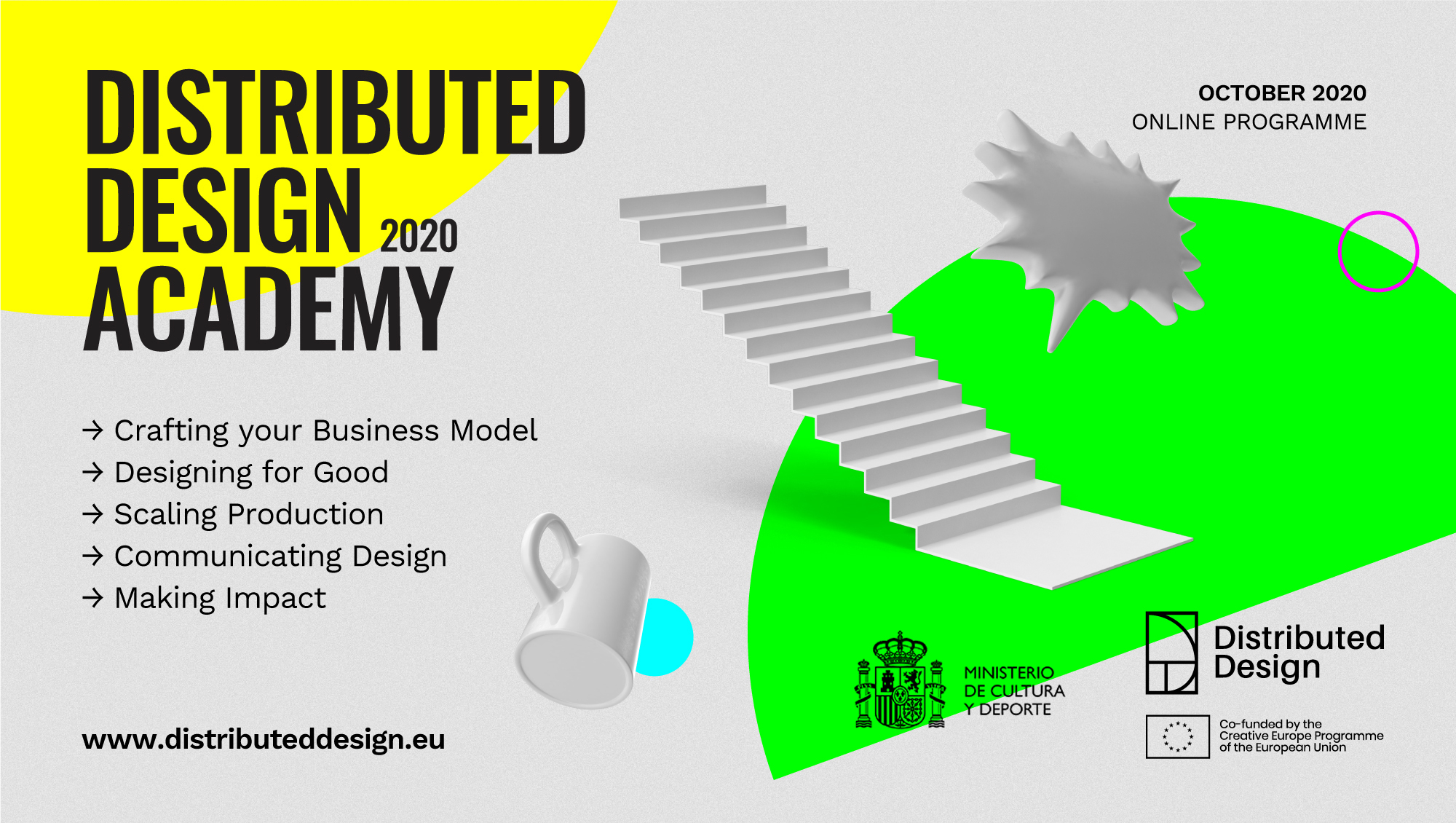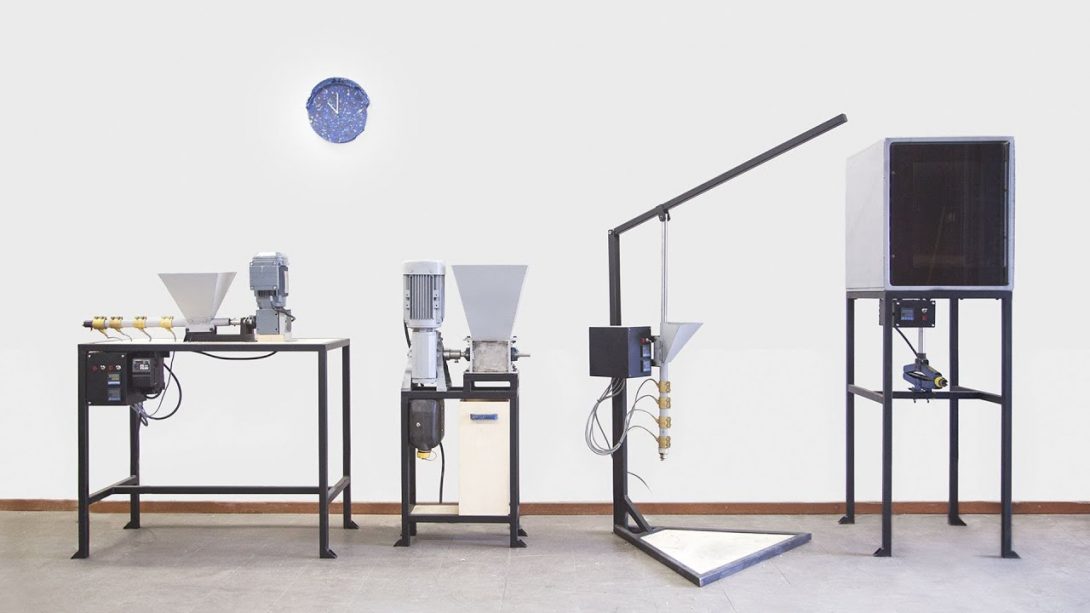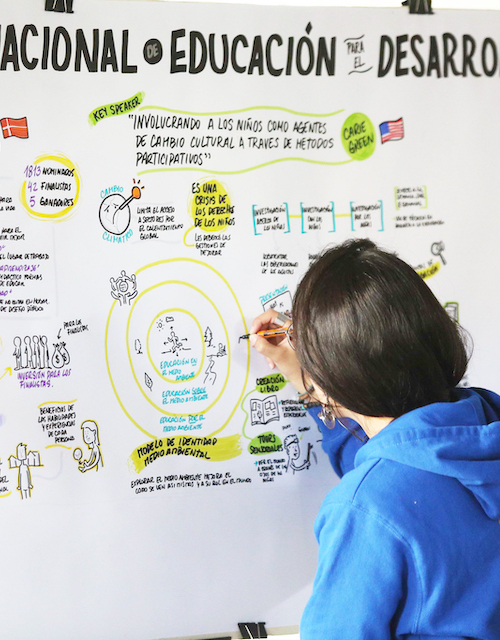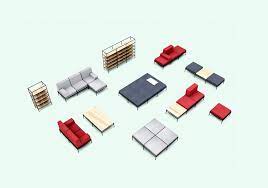Every year the Fab Lab Barcelona organises and runs an academy as a form of knowledge exchange based around a series of projects that are carried out by Distributed Design Platform members in line with distributed design principles. The previous academies have taken place in Paris (2018) and Eindhoven (2019), and for the first time, in 2020 the academy took occurred in a fully, online distributed manner due to the COVID-19 global pandemic.
The concept the 2020 of the academy was based around upskilling designers and makers working in digital fabrication and empowering them with a set of tools to help them meet new and emerging markets.
The Distributed Design Academy aims to provide members of the Distributed Design Platform network the opportunity to expand their knowledge and practice distributed design principles in a hands-on interactive workshop environment. Participants in the academy coming from the different Distributed Design Platform members means that an environment is created for knowledge exchange and collaboration which enables varying perspectives on what distributed design means in different contexts whilst being able to strengthen their personal network. In the 2020 edition, the goal was for participants to deepen their entrepreneurial knowledge and provide inspiration and guidance on how to access new markets.
Academy Structure
The format of the academy was developed to provide a balance of three key components to provide different but complementary activities allowing for differing perspectives on the programme content but also the space to reflect on key learnings. Each week there was a homework task that builds on a workshop activity which was then reviewed at the beginning of each session. The structure of each session looked like this:
15h – Peer to Peer Session: Guided by Fab Lab Barcelona’s Future Learning research area & hosted by Fab Lab Barcelona Team member.
15:30h Live Talks!: Talk with Q&A session from speaker introduced by Kate Armstrong, Distributed Design Project Manager of the Fab Lab Barcelona.
16:30h Interactive Session: Hosted and delivered by a Fab Lab Barcelona team member including hands-on activity.
Programme Content
The content of the academy was divided into 5 modules with a module each week. Both the talk from the guest speaker and contents of the interactive session were related to the topic of the week.
Week 1 – Crafting your business model
Crafting a business model is a key component of ensuring the sustainability of you and your projects. This session covered the basic building blocks when you are just getting started, and walked participants through the tools to apply to their ideas. Joseph Klatt, the Business Guy at Precious Plastic, showed how Precious Plastic has used these concepts to assist our community of organizations around the world and Precious Plastic itself as the umbrella organization. Alessandra Schmidt from Fab Lab Barcelona ran the interactive session in which she introduced participants to tools for creating business models.
Week 2 – Scaling Production
This week gave an overview, from the perspective of a product designer (Katrine Hesseldahl – Phd-student at the Burberry Material Futures Research Group, Royal College of Art ), of the key ways in which new distributed methods of production are changing the industry of design. Students explored how on-demand, local forms of production affect the relationship between producers and consumers, how it is changing the role of designers, and how, if designers learn to use it wisely, it might offer more sustainable alternatives to conventional mass production. Santi Fuentemilla from Fab Lab Barcelona provided insights into scaling production of projects using local maker networks during the interactive session.
Week 3 – Designing For Good
Week three of the academy featured Tom Meades – Co-Founder, Product & Process at GOMI. Tom walked our students through how technology is one of the most polluting industries on Earth and what could be done to change that. Tom began exploring the concept of making waste valuable, through redesigning the beloved tech products of our generation. He co-founded Gomi in 2018 and created a team of innovators who have since brought to life a series of tech products made from locally sourced waste materials, such as non-recyclable plastic waste, and most recently reclaimed battery cells. Milena Juarez from Fab Lab Barcelona was in charge of training participants to consider the sustainability and product life cycle of the project.
Week 4 – Communicating Design
In this session, Emma Koubayssi, Communication and Coaching at Animas Centre for Coaching blended her skills, passion and knowledge as a transformational coach and award-winning communicator and storyteller to deep dive into this concept. Together the students explored; the evolution of brand purpose, the importance of understanding your why, what we can learn from brand adoption and the future of purpose. On this occasion, Marcel Rodriguez from Fab Lab Barcelona delivered the interactive session of the Academy.
Week 5 – Making Impact
Form isn’t enough when designing solutions to global challenges, impact and context are equally important, and perhaps even more. Together the three are the pillars of design to improve life. In this week, students discussed these concepts with Mariano Alesandro – Head of Future Thinking & Technology at The Index Project, to see some of the best design to improve life examples coming from the Index Awards. Also, Guillem Camprodon from Fab Lab Barcelona gave participants a chance to learn how to consider real-world impact with their projects and their role as a designer during the interactive session.
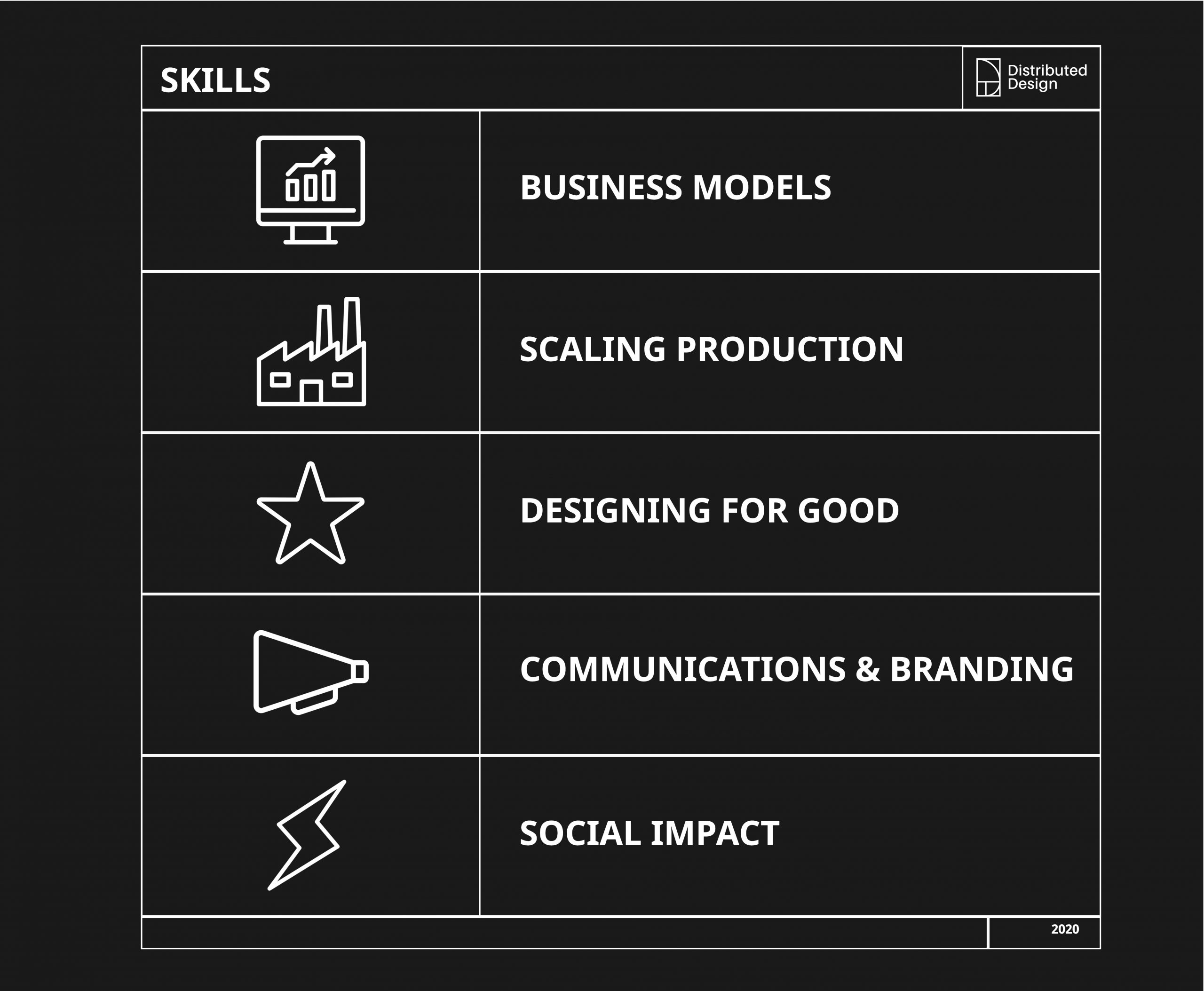
Resources
Interactive Sessions content was delivered on Miro canvases. Participants worked simultaneously on the Miro resources provided by the instructors during the Academy sessions. The Academy resources from the fully online distributed course are now free to use by upcoming designers and makers who want to deepen their entrepreneurial knowledge and provide inspiration and guidance on how to access new markets. These resources can also be used by instructors and schools to help them bring perspectives on what distributed design means in different contexts. Canvases Toolkit was licensed under a Creative Commons Attribution-Non Commercial-ShareAlike 4.0 International License. As part of the distributed learning strategy from Fab Lab Barcelona at IAAC, coordinators of the Distributed Design Platform, the Canvases Toolkit are also free to download online in three languages: English, Spanish and French, both as Miro board and PDFs. Check the Projects Resources section here.
GET YOUR HANDS ON THE ACADEMY RESOURCES
Interview with Oliver Juggins, Distributed Learning Facilitator
We spoke to Oliver Juggins, a new member to the Fab Lab Barcelona team with an impressive experience of teaching hands-on workshops on topics such as AI and Machine Learning and graduate of the first edition of the Master in Design for Emergent Futures (2018 – 2019) to get an insight into how this year’s Distributed Design Academy will run remotely.
You’ve been helping out with the Distributed Design Academy – what activities are you planning to run with the makers and where are they based?
“The participants are based all over Europe and are connected to the different members of the Distributed Design Platform, so there will be designers from Portugal, Iceland, Hungary and Denmark among others. We are planning a range of activities based around the theme of “makers meeting new and emerging markets” and have five core modules covering areas including business model generation, brand building and communication and making an impact. Each of the five sessions will be formed of three parts: a peer to peer knowledge exchange, guest speaker and an interactive session led by a member of the Fab Lab Barcelona team. The aim is to provide a balance of inspiration and hands-on activities that the participants can then apply to their own project they will work on in small groups.”
What challenges have you had to overcome due to teaching remotely? Or in the case that you haven’t started yet, how are you preparing to teach remotely?
“We have been preparing remote teaching by adapting the methodology that has been developed over the years in the different academies and educational programmes to an online setting. This involves a “learn-by-doing” approach so the challenge is thinking about how the interactive student experience that usually happens in the Fab Lab Barcelona can be maintained in a virtual environment. In preparation, we have been creating a series of guides and recommendations for the different learning experiences and types of classes that will happen and how to use the virtual environment as an opportunity. An example is implementing different synchronous and asynchronous types of communication so that there are clear channels of communication with students and a place for them to get feedback, share ideas and build a community.”
Any tips for teaching remotely?
“I’m still learning what are the best practices and tips! But some initial tips could be having a good setup with an extra monitor, webcam, headphones and microphone and to keep classes short with lots of breaks. Something else I am trying to consider are the aspects of in-person teaching that do not necessarily form part of a traditional class but are still important. As an example, the social interactions between students and instructors in breaks and the chit-chat before a class starts, which are often situations and spaces where students share ideas, form connections and get to know each other. How to create these situations virtually will be a challenge but it’s something that I’ll be testing throughout the year.”
Leveraging Hybrid Learning Models
Transforming the 2020 Distributed Design Academy into a fully digital experience was necessary due to COVID-19 restrictions. While incredibly challenging, it also provided us new opportunities, ways to learn, and most importantly created a more robust documentation and digital catalogue of the process in comparison to previous in-person sessions. This legacy lives on in the form of the both the accessible miro boards to see the students work, as well as gave us the opportunity to record and share specific sessions with the public.
Whether future learning will be in-person, fully digital, or a hybrid approach is yet to be determined, what is clear moving forward is that making knowledge sharing accessible to more people through digital means is not only a good thing to do, it is the embodiment of distributed design principals- sharing knowledge on a global scale while encouraging localised making. We hope you will join us for future Distributed Design Academies and educational sessions!
This activity was made possible with the support of the ‘Ministerio de Cultura y Deporte de España’ and acts as an additional resource for the Distributed Design Academy 2020
